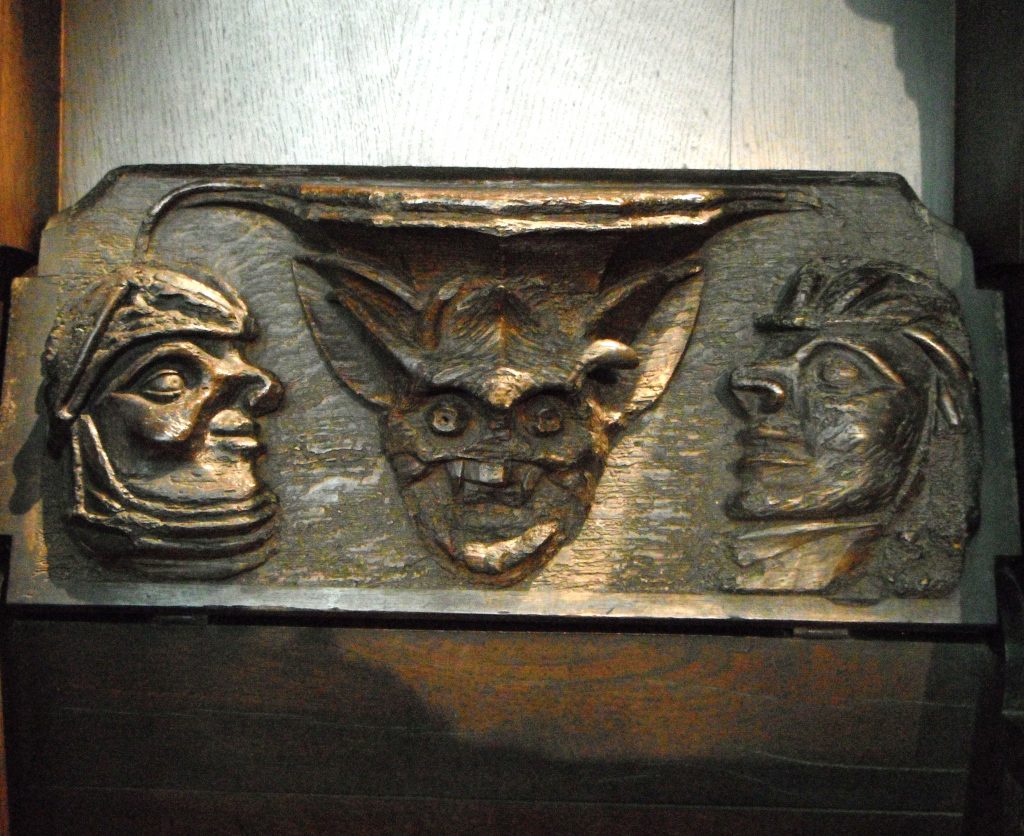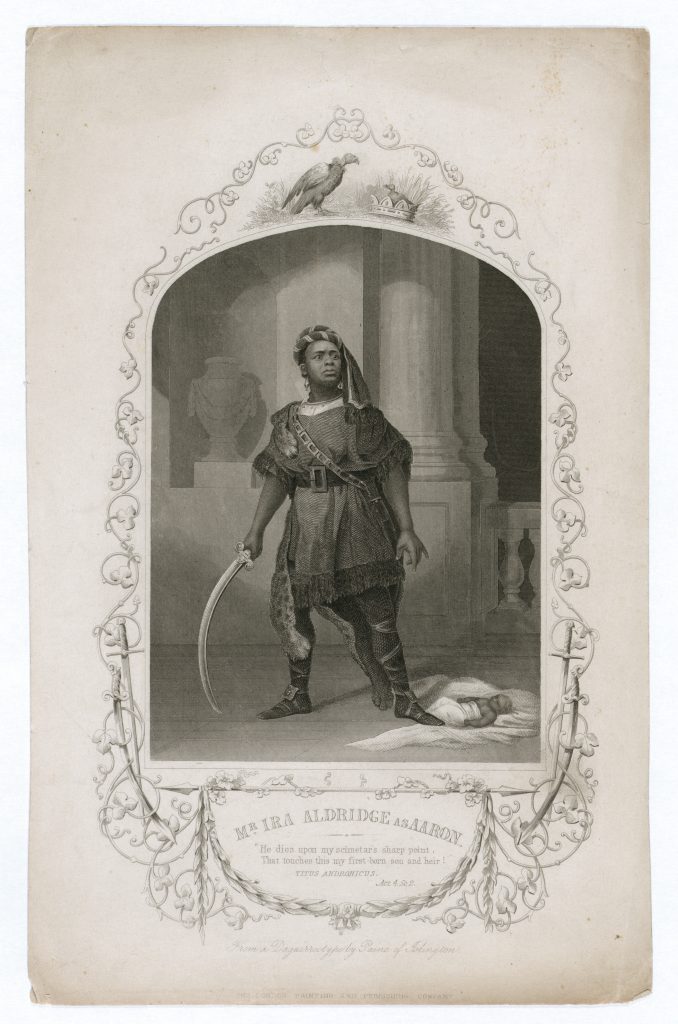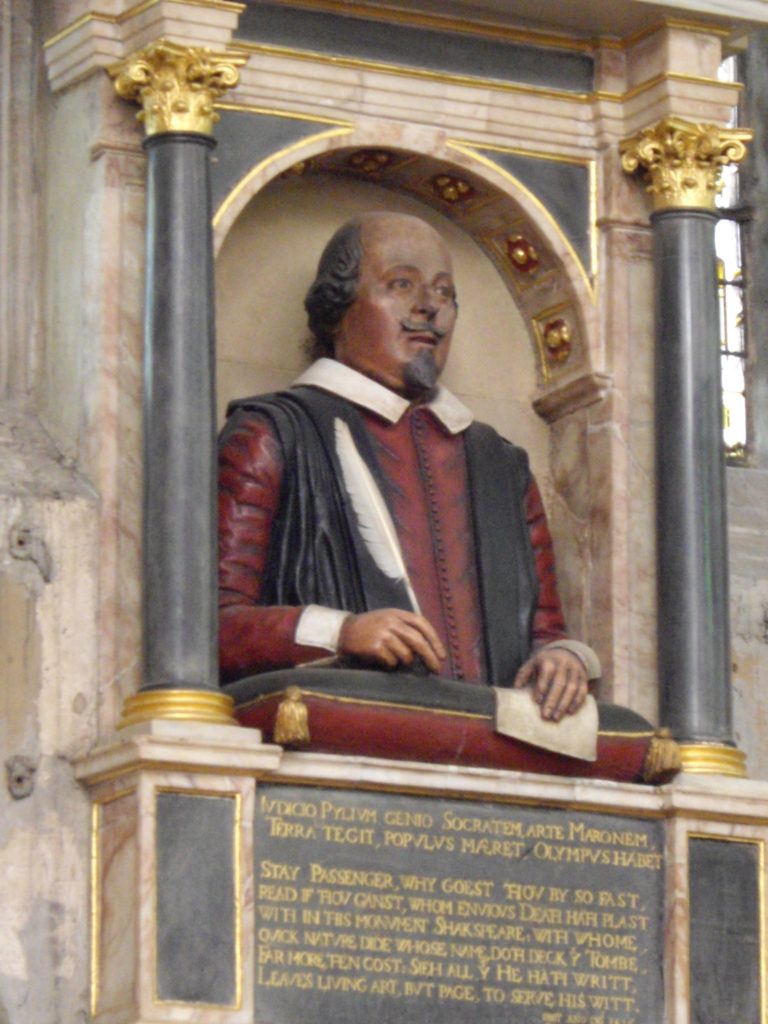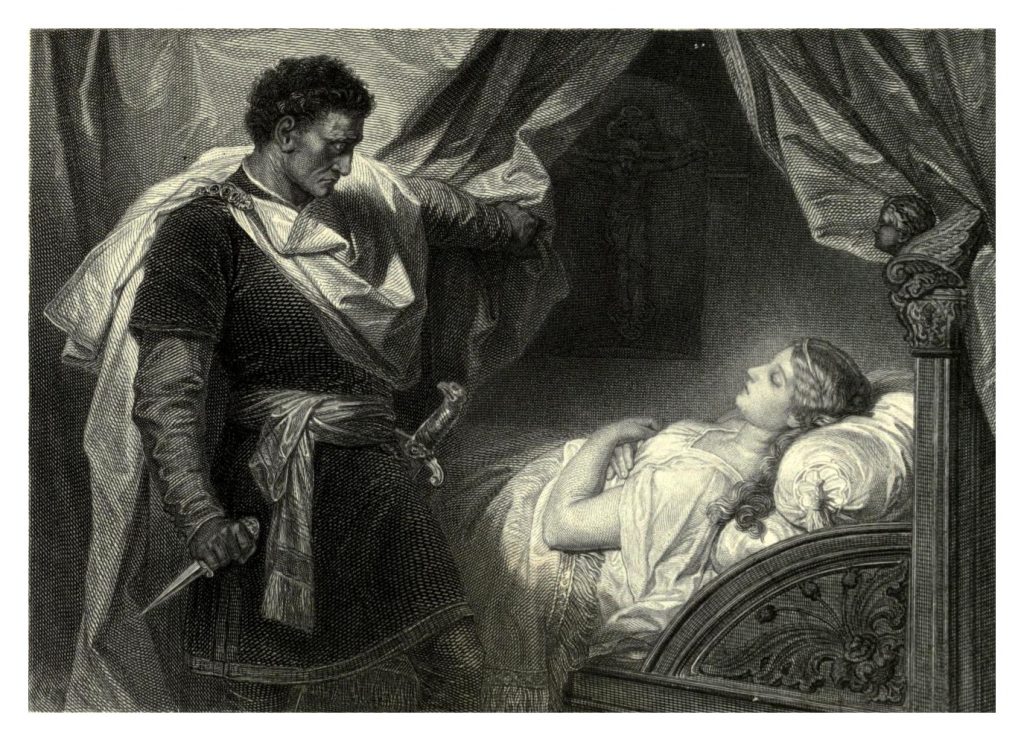William Shakespeare turned 400 last year. Christopher Jackson revisits his work to find that Shakespeare’s journey as a writer has much to teach us about the relationship today between Islam and Christianity.
In Trinity Church in Stratford-upon-Avon, there is something beautiful.
It isn’t the bust of William Shakespeare on the north wall, which depicts the poet looking rather overweight and none too inspiring. The most vexing thing about that monument is that it is not a misrepresentation of the poet so much as a misrepresentation of our idea of the poet. Sanctioned by those who knew him, it is presumably more a likeness than we tend to think. But it reminds us that this was Shakespeare’s church. Here he was baptised and buried, and made unheralded visits down the years.
For beauty, one must instead go up to the chancel to see the church’s magnificent set of medieval misericords — the ledges on the wooden seats intended to give weary clergy a break during long services. The fact that medieval architects and craftsmen saw them as an opportunity for art is a measure of the fecundity of the visual imagination of that period. The images are also testament to a certain permissiveness about pre-Reformation Britain, and indeed pre-Reformation Europe. We witness everyday scenes: a set of grimacing masks, a termagant wife lambasting her husband with a saucepan, a mermaid cheerily playing what might be a lute.

A misericord of a set of monstrous heads, where the central head has been smashed to pieces. Misericord, Holy Trinity, Stratford-upon-Avon >Flickr/ John W. Schulze
In Protestantism — as in Islam, as Elizabeth I would later remind representatives of the Ottoman Empire in hopes of forming an alliance against Spain — human depiction is not permitted in the place of worship: the Protestant God, like Allah, is too great and unknowable to be reliably represented. This isn’t so in Catholicism. The medieval carver, like Shakespeare in his drama, was permitted to include all life. But there is one sculpture in Trinity that particularly interests me, as it also interests Alison Shell in her excellent study Shakespeare and Religion. It is a misericord of a set of monstrous heads, where the central head has been smashed to pieces. Shell speculates that “it may have fallen foul of an iconoclast who disapproved of entertainers in God’s house.”
This ruined sculpture is a symbol of religious flux and of the upheavals experienced in Shakespeare’s society. It is a reminder that, about half a mile from Shakespeare’s own house, the greatest writer of them all inhabited a fractured world. The Catholic church had been successfully challenged by the likes of those who defaced this sculpture, but its influence had not been forgotten and was in many cases still cherished, as we see by the fact of these misericords surviving at all. This tension would have implications across society. Once Christianity had shown itself to be insecure, a rethink was on. The comprehensive character of the intellectual opportunity was perhaps difficult to see at the outset — Shakespeare the boy could not have known that it would encompass not only a recasting of Christianity, but also a series of imaginative encounters with the unknown Other of the day: the Muslim.
Toward Titus Andronicus
It is a reasonably safe bet to say that there were no Muslims in Stratford-upon-Avon in Shakespeare’s time. And yet there was already flux, as we see in that misericord. It might also be said that these changes were two-pronged. On the one hand, Shakespeare inhabited a world dominated by schism within Christianity, but he also lived at a time when the Renaissance had crossed from mainland Europe and found a foothold within even rural English life. It is well established that Shakespeare’s schooling was essentially classical, though his contemporary Ben Jonson famously stated that his friend had “smalle Latine, and lesse Greeke.” (B. Jonson, To the Memory of My Beloved the Author, Mr. William Shakespeare and What He Hath Left Us, first published in the First Folio)
Shakespeare’s line was always capable of more, able even in its infancy to dart to surprising places, admit contrary truths, turn expectation inside out.
This accounts for his lifelong fascination with Ovid’s Metamorphoses, and to a lesser extent, with Horace and Virgil. This is important, not just because it opened Shakespeare’s mind to pagan values, but also because it can be seen as part of a general relaxation toward the Christian viewpoint. Once the strictures of the Catholic church had been jettisoned, even in part, an intellect like Shakespeare’s, given to roaming in any case, could roam further. Besides, great movements of intellectual advancement are inherently international in character, as the Enlightenment and modern science remind us. Shakespeare was born into a fundamentally open world. This did not in itself give him Othello, but it gave him the possibility of one day writing it.
Shakespeare did not complete his journey all in one go; like all poets, he came gradually into his powers. This is especially the case with regard to his portrayal of Islam: His sporadic progress on the issue suggests that it may have had the character of a difficult problem for him. We can imagine that one of the key events of Shakespeare’s life must have been his first arrival in London some time in the late 1580s (an event brilliantly recreated in Anthony Burgess’ 1964 novel Nothing Like the Sun). In that book, the sights, sounds and smells of London jostle with one another thrillingly as the country boy encounters the urban environment for the first time: the centrality of money, the sense that here in the capital political power resides, sexual license, and of course, other nationalities. Shakespeare’s keen senses would have encountered these things all at once. We know that there were not many Jews and Muslims in London at that time, but their presence even in small numbers had enormous imaginative repercussions. In Shakespeare’s maturity, his contribution toward his contemporaries’ understanding of these other religions would be Shylock in Merchant of Venice and the eponymous hero of Othello. But it took him a while to get to this point: We know this from the example of Aaron the Moor in the Bard’s early play Titus Andronicus.

Ira Aldridge as Aaron in Shakespeare’s Titus Andronicus. >Photo via Paine of Islington
Titus is difficult to date, but it is certainly an early play written between 1588 and 1593, with a youthful freshness upon it in spite of the grim subject matter — like morning dew on an animal carcass. If one wanted a contemporary comparison, one would cite Quentin Tarantino: In this somewhat anomalous play (it was the last play in the canon this author read, an experience that may not be uncommon), everything tends, often in defiance of credibility, toward gore and violence. Titus Andronicus is a celebrated general who returns from the battlefield when there is a power vacuum in Rome. Among those captured in the battles is the Empress of the Goths, Tamora. Andronicus refuses clemency for her sons, and they are put to death. But the future Emperor Saturninus chooses Tamora as his bride, and she harbors an understandable grudge against Titus. She will embark on a spree of revenge, and barely needs prodding toward doing so by the villain Aaron.
The intellectual weather of the play is pagan. It is a look into a harsh world where grace and forgiveness aren’t operative. This gives it an air of unreality. In later tragedies, Shakespeare will carefully include characters inclined to pity the grim fate of the protagonists — one thinks of Kent in King Lear (1606), or Horatio in Hamlet (1599-1601). In Titus, there is no such character; here, nobody is wholly good or kind. Titus’ daughter Lavinia is raped by Tamora’s sons, and has her tongue and hands cut off. At the end of the play, once he has been found out, Aaron explains his motivations in a passage that makes him synonymous with the devil. Lucius, Titus’ son, asks Aaron if he is sorry for his deeds. He replies:
Ay, that I had not done a thousand more.
Even now I curse the day — and yet, I think,
Few come within the compass of my curse —
Wherein I did not some notorious ill:
As kill a man, or else devise his death;
Ravish a maid, or plot the way to do it;
Accuse some innocent, and forswear myself;
Set deadly enmity between two friends;
Make poor men’s cattle break their necks;
Set fire on barns and hay-stacks in the night,
And bid the owners quench them with their tears.
This is Shakespeare’s first depiction of the Islamic Other: The extent of Aaron’s activities in this passage recalls the devil’s ubiquity. The passage is longer and it is difficult to see it as other than a clichaic burst of xenophobic lyricism. It is excusable on the grounds of youth: Shakespeare, when he wrote Titus, was not yet at the point where he was prepared to challenge the expectations of his audiences as he would later do.
Shakespeare is also working here within the tremendous shadow of Christopher Marlowe: His audiences would have known Marlowe’s Tamburlaine and The Jew of Malta, both of which tell us something about the Elizabethan understanding of Islam. In The Jew of Malta, Marlowe created the hybrid Muslim Ithamore and made him a willing assistant to Barabas’ murderous streak. Jonathan Bate in The Soul of the Age: the Life, Mind and World of William Shakespeare points out that Marlowe’s Ithamore probably refers to the Jewish name Ithamar. In the Bible, Ithamar’s father is Aaron; hence Shakespeare in Titus gave his character the name of Marlowe’s character’s father — a writerly wink whose meaning is lost in time. Marlowe’s death in the Deptford tavern in 1593, probably soon after Titus was written, removed Shakespeare’s inhibitions in all sorts of ways, including in his depiction of Islam. Indeed it took Shakespeare around a decade to move from the Marlovian interpretation of Islam (as seen in the character of Aaron in Titus) to the purely Shakespearean interpretation of the same subject matter in Othello. This might in itself be taken as a measure of Marlowe’s influence over the younger writer.
All of Shakespeare’s characters are sheltered within the vast democracy of this truth-searching instrument of language: Each can at any moment be redeemed by it.
And yet there is one way in which Shakespeare was already ahead of Marlowe in Titus Andronicus in his depiction of Islam. In Marlowe, there is something strident in the Tamburlaine line, which seems a kind of verdict on Tamburlaine himself. Shakespeare’s line was always capable of more, able even in its infancy to dart to surprising places, admit contrary truths, turn expectation inside out. Even in the Aaron passage quoted above, for instance, Aaron does not answer the question directly — he turns it on its head. He is not only not ashamed of his deeds, he is ashamed that he hasn’t committed more. All of Shakespeare’s characters are sheltered within the vast democracy of this truth-searching instrument of language: Each can at any moment be redeemed by it. All his characters have this terrific resource at their disposal and so when redemption is refused, as is the case with Iago in Othello, part of this can be a refusal of language. Iago’s unapologetic silence at the end of Othello suggests that he has gone to a very dark place indeed — a place of no explanations, almost nonbeing, where Shakespearean verse cannot accompany him.
Aaron does not refuse language. Consider his opening lines, which describe his mistress’ ascension to the position of Empress:
Now climbeth Tamora Olympus’ top,
Safe out of Fortune’s shot; and sits aloft,
Secure of thunder’s crack or lightning’s flash,
Advanced above pale envy’s threatening reach.
As when the golden sun salutes the morn,
And, having gilt the ocean with his beams,
Gallops the zodiac in his glistering coach
And overlooks the highest-peering hills;
So Tamora.
The first four lines sound a lot like Marlowe. The second quatrain hasn’t wholly shed his influence but is beginning to have the Shakespearean ring. The swift pivot of “So Tamora” is wholly Shakespeare; it exhibits the pattern of an individual mind. We can spin this either way: We could stress the extent of Marlowe’s influence, or we could say (which might be truer) that Shakespeare ends up sounding like Shakespeare even when he is trying to sound like Marlowe. Soon, he would sound only like himself, no matter who he was writing about, and still have enough flexibility within the beat of his verse to make provision for individual character. This marks Shakespeare out as a wonderful poet, but it also makes him a superb political thinker and thinker about race, because Shylock and Othello will speak like Shakespeare too. Great poetry is always inherently moral like this.
The Role of Islam in Elizabethan England
Whether we are inclined to be impressed by the young Shakespeare’s progress at this early stage in his career or to wish him more himself earlier on, Titus ought to alert us to certain realities about Elizabethan England. The caricature of the typical Muslim on the Elizabethan stage was in part a function of fear, or at least to do with a sense that the Islamic Other was not a weak Other. The cartoonist is often fearful of his subject, otherwise he could bear to look at it more closely. The Ottoman Empire had a stranglehold over the Elizabethan imagination for two reasons: It was different, and it was powerful. The Mediterranean theater during Shakespeare’s time was in a state of tense equilibrium: The Spanish (loathed enemies of Elizabeth’s England) vied with the Ottoman Empire. The division point was the little slice of sea between Sicily and Tunisia. It was a rivalry that could occasionally flare up and was not as remote in people’s minds as we might think. Many English pirates captured by the Ottomans turned renegade — that is, they converted to Islam. In some cases, as with celebrity pirates like Edwards and Samson, they became legendary for their luxurious lives on the north coast of Africa.
These pirates were not eking out an existence; they became men of power. Accordingly, in day-to-day life, as Nabil Matar explains in Islam in Britain: 1558-1665, these men were not vilified: They were traded with as an exotic fact of life, a contingency to be reckoned with. Meanwhile, many English pirates sold into slavery went on to become feared soldiers in Ottoman armies.

The bust of William Shakespeare on the north wall of Trinity Church, which depicts the poet looking rather overweight and none too inspiring. Sanctioned by those who knew him, it is presumably more a likeness than we tend to think. But it reminds us that this was Shakespeare’s church. Here he was baptised and buried, and made unheralded visits down the years. >Flickr/K.L. Walsh
These hard realities were not designed to delight many Elizabethans. The stage therefore became a place to work through insecurities naturally arising from them. In Thomas Kyd’s The Tragedy of Soliman and Perseda (1588), Kyd makes it clear (like a good Elizabethan propagandist) that the renegade Basilico could only have converted to Islam to gratify base sexual desire, and out of queasy moral character. Kyd started a trend. In subsequent plays, such as Thomas Heywood’s The Fair Maid of the West (1604-1610), the renegade is made a mockable figure. In that play, Clem has been castrated to become chief eunuch, thus further cementing in the minds of audiences the undesirability of making any accommodation with Islam.
Throughout Shakespeare’s life, these attitudes were hardening. Shakespeare, as we shall see, was working contrary to prevailing trends. The culmination of this was Robert Daborne’s stern 1612 play (published four years before Shakespeare’s death) A Christian Turn’d Turke, or the Tragical Lives of the Two Famous Pyrates, Ward and Danisker. This is an open denunciation of the pirate Ward who, living in style in the East, had sometimes been (so Daborne felt) overpraised for his apostasy. (Daborne would later leave the theater for the church.) In this play, a ceremony shows Ward undergoing in dumb show “the trivial ceremonies” of “turning Turke.” There is another echo here of Marlowe since the scene recalls a similar moment in Doctor Faustus when, also in dumb show, Faust sees all his future sins parade before him as a result of his contract with the devil. Once again then, the Turke (the Islamic Other) is synonymous with the devil, as we have seen to be the case with Aaron the Moor in Shakespeare’s Titus Andronicus. All this makes the leap of imagination Shakespeare was about to make all the more remarkable.
The Originality of Othello
Shakespeare wrote Othello while living in Silver Street — a salubrious, leafy part of the city, distinct from the Bohemian accommodation he had endured in the 1580s and ’90s, in Shoreditch and Paris Gardens. He was lodging with the Mountjoys, who were Huguenots — a persecuted Protestant minority that fled from France. It is tempting to infer that his friendship with the family may have developed further his tendency toward inclusiveness when it came to those outside the societal norm.
Othello is a Moor, a Black military hero who has risen within the predominantly White ranks of the Venetian army, and is married to Desdemona, daughter of a White senator. At the start of the play, no one — not even Othello himself — knows that he has a propensity for sexual jealousy. However, fears over his wife’s faithfulness are awoken by his lieutenant Iago, the most purely evil character Shakespeare ever created. From the text as we have it, his reasons for bringing on Othello’s jealousy are not clear, prompting Coleridge to deliver his famous verdict: “The motive-hunting of motiveless malignity.” (Coleridge wrote down the remark in his copy of Shakespeare. The book is now in the British Library.) Othello’s downfall flows out of a contemporary stereotype: the uncontrolled rage of the essentially inferior (because unChristian) Other. Once his jealousy is locked in, Othello says:
Arise, black vengeance, from the hollow hell!
Yield up, O love, thy crown and hearted throne
To tyrannous hate!
He seems to be confessing that all his previous togetherness, his military bearing and claim to have become a Christian, was a mere front and that he must now, in his extremity, revert to an inherent weakness linked somehow to the color of his skin: “black vengeance.”
Though there is this shred of audience-pandering or perhaps even prejudice on the part of the author, Shakespeare’s play is also a gigantic advance on anything that had gone before. In the first place, the depiction of Othello is full of sympathy: He is first and foremost a soldier and as A.D. Nuttall has observed in Shakespeare the Thinker, his real weakness before Iago’s schemes is not at all race-related: his is the predicament of the “hero who went into a house.” Othello has, to use his own words, “loved not wisely but too well” as the military type is prone to do. The curious comforts of the battlefield are swapped for what is, for Othello, an alien jurisdiction: that of home. He knows how to handle military matters, but is at sea in the domestic sphere. Othello is in fact a trusting man, who is only given to murderous jealousy after the most ardent efforts of Iago — a man of immense skill — toward that end.

Shakespeare’s Othello and Desdemona as illustrated in 1876. >Flickr/Cesar Ojeda
Shakespeare has flipped the prevailing cliché on its head: Othello is the opposite of a renegade; he is a Moorish man who has converted to Christianity. He has earned the trust of the Venetian people, and won the love of Desdemona. It is true that within the play, this regard can seem flimsy. There are racist whispers throughout. In Act One, Iago taunts Desdemona’s father Brabantio with the racist image, “a black ram is tupping your white ewe,” because he knows the damage it will do. But Othello’s position has still been achieved fair and square and would have remained intact had it not been for Iago’s dedicated program of sabotage.
Shakespeare gave us the world in its truth: He rushed past the prejudices of the day, of the immediate future, and well beyond the Trumpian folly of our own time, into an eternal house of tolerance
Othello makes an essentially human mistake. His is not really black vengeance, but human vengeance and Shakespeare knows this. Aaron is made to behave as he does because he is of his type: He does not believe the gospel and so cannot comprehend any doctrine of Christian fair play. Whereas Othello could have acted in some other way, his identity is free and he is not bound up in cliché. We might think this insight obvious, or wish that human beings were always this grownup. The political events of 2016 show us that, alas, this isn’t always the case; the Shakespearean empathy is rarer than it should be, which is a powerful reason, among many, to re-encounter Shakespeare.
All this reaches something like resolution in Othello’s great last soliloquy, spoken as he considers the suffocation of Desdemona.
It is the cause, it is the cause, my soul –
Let me not name it to you, you chaste stars! –
It is the cause. Yet I’ll not shame her blood;
Nor scar that whiter skin of hers than snow,
And smooth as monumental alabaster.
The kiss that follows (“One more, and this the last: and love thee after”) is not only a moment of supreme drama where a man obviously in love is compelled toward an uncharacteristic and catastrophic action, it is also a beautiful image. Some have even seen in it an image of reconciliation between East and West, the Black face of Othello kissing the “alabaster” skin of Desdemona. But by this stage in his career, Shakespeare was creating complete people, in all their complexity and strife, their loves and their susceptibilities. To call them symbols is to reduce them to abstraction. Shakespeare instead gave us the world in its truth: He rushed past the prejudices of the day, of the immediate future, and well beyond the Trumpian folly of our own time, into an eternal house of tolerance. Shakespeare’s is a grownup architecture, and the majestic look of it was one of his many gifts to us. It is natural as a Warwickshire oak — springing out of the earth, unminding of faction or splinter groups, and as full of robust life and everyday conceits as those misericord sculptures in Trinity church.
And when things are smashed like the Catholic consensus, as exemplified by that misericord, the broken pieces are used to rebuild. Amid the confusions of the Reformation, Shakespeare found the courage to say that we are involved, all of us, first and foremost in the human comedy.
*Image: Misericord, Holy Trinity, Stratford-upon-Avon. >Flickr> John W. Schulze





